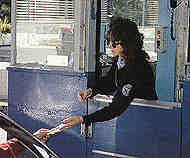Link to article here.
So how many of us get to pick and choose which laws we follow and which ones we don't? Apparently the road lobby and its minions at TxDOT and the toll authorities think the almighty dollar trumps abiding by the law. Where is the justice?
Despite 2009 law, still no free tolls for disabled veterans in Central Texas
By Jeremy Schwartz
Austin American Statesman
Published: 9:43 p.m. Saturday, July 28, 2012
In the three years since the Texas Legislature passed a bill giving the state's toll road agencies the authority to grant free rides to disabled veterans, the two agencies that manage pay-to-ride roads in Central Texas have yet to implement the toll discount and don't have any immediate plans to do so. Statewide, only toll authorities in the Houston area have adopted the 2009 law.
The inaction has angered veterans groups and legislators. "I was hoping that it would be a simple decision," said former state Rep. Abel Herrero of Corpus Christi, who co-wrote the 2009 bill. "I would have thought that this many years later that all those authorities would see it as an opportunity, a way to say thank you. I'm shocked it hasn't happened."
Some toll officials in the state worry the veteran toll discount would open a Pandora's box of toll discounts for other groups. Others say it could be too expensive, despite the experience of Harris County toll officials.
The area's largest toll road authority — the Texas Department of Transportation, which operates Texas 45 North and Southeast, Loop 1 and Texas 130 — says that granting free tolls for disabled veterans could negatively affect annual revenues by up to 10 percent, based on a 2009 analysis of disabled veteran and Purple Heart plates in Travis and Williamson counties.
That worst case finding was based on each driver with a disabled veteran, Purple Heart or Medal of Honor plate making a round trip five days a week. Department officials said they also took into account Austin's geographic location between military installations in San Antonio and Fort Hood.
That conclusion stands in sharp contrast to the experience of the Harris County Toll Road Authority, which reports that disabled veterans account for just 0.8 percent of toll transactions.
In Travis County, 3,637 drivers have disabled veteran or Purple Heart license plates, or 0.4 percent of the county's 973,609 registered vehicles. In Williamson County, 0.7 percent of drivers have the plates. In heavily veteran Bell County to the north, home to a large Department of Veterans Affairs hospital in Temple, disabled veterans account for about 4 percent of drivers.
The timing of the 2009 law seemed propitious: With wars raging in Iraq and Afghanistan, record numbers of veterans were returning home with combat stress and other war injuries and seeking medical care. The bill's supporters argued that the discounts would have minimal effect on toll revenues while helping veterans defray the cost of driving to medical clinics and hospitals. And the law seemed in sync with the boasts of state leaders that Texas takes better care of its veterans than other states. During the same legislative session, Gov. Rick Perry signed a law exempting disabled veterans from property taxes.
But the measure appears to have crashed against the dollars-and-cents realities of toll road administration.
"The people who operate toll authorities are constantly getting requests to exempt this group and that, and they hate it," said Peter Samuel, a Maryland-based toll expert who publishes an industry newsletter, Toll Road News. "They see it as one more complication to their accounting and enforcement. They are worried if they give it to veterans that it will be used for other groups and soon you have a huge hodgepodge of different prices for different people."
Local toll officials also worry about the precedent of free tolls for certain groups.
"On the surface it seems fairly innocuous," said Mike Heiligstein, executive director of the Central Texas Regional Mobility Authority, which operates 183-A. It is building a U.S. 290 tollway in Northeast Austin and next year will probably break ground on MoPac Boulevard (Loop 1) toll lanes. "But I would be concerned about, Where do you draw the line? What we don't want is to start the process of exemptions and not know where it stops."
State Sen. Leticia Van de Putte, who sponsored the original bill, said she does not believe the law would lead toll authorities down that slippery slope. Van de Putte, a San Antonio Democrat who leads the Senate's Veteran Affairs and Military Installations Committee, said the state has traditionally singled out disabled veterans for special privileges and accommodations such as free or reduced-fee hunting licenses and specialty license plates. "As nice as it would be to help teachers, there are not statues of slain teachers at the capital," she said.
Toll authorities also argue their legal agreements with bondholders to borrow money prohibit them from granting discounts. TxDOT told legislators that its covenant does "not provide the flexibility for a toll reduction or exemption program for disabled veterans."
The transportation agency's bondholder agreement prohibits reduced or free tolls except under certain narrow circumstances. Last year TxDOT significantly reduced truck fares in an attempt to lure more trucks away from Interstate 35. Its bondholder agreement allows discounts if they are expected to eventually result in an increase in revenues.
But experts also say toll agencies may renegotiate their agreements with bondholders, especially if they can demonstrate that the reductions won't affect loan payments. Samuel said the authorities typically oppose such discount programs. "Unless the members of the board of a toll authority are very convinced that this is an important thing to do, unless they are very keen to do it, they are likely to resist it," he said.
Veteran toll discounts are rare across the country. The New York State Thruway Authority grants veterans free tolls if they qualify for an adaptive vehicle through the Department of Veterans Affairs, usually given to veterans who have suffered amputations or hand and foot injuries.
In Florida, disabled veterans can receive exemptions if they have permanent upper body impairments that prevent them from reaching out of their car to drop cash into a toll basket. And in Orange County, Calif., drivers with disabled veteran license plates receive free passage except during rush hour, when their tolls are discounted.
Veteran advocates say the law that emerged out of the 2009 legislative session had two major limitations. It does not require toll agencies to adopt a disabled veteran program, it merely permits it.
The 2009 Legislature, operating at the height of the recession, also did not appropriate any funding to toll authorities to replace any revenue lost as a result of adopting the program.
Despite those limitations, Houston area officials embraced the law in 2009, after what one veteran advocate said was a single meeting with toll officials over brisket.
"We felt it was important to give this advantage to our veterans," said Eric Hanson, spokesman for the Harris County Toll Road Authority, which has operated toll roads for more than two decades and is overseen by county commissioners. The Central Texas authorities are led by boards of political appointees.
Over the past three years, the program has cost the authority about $6 million — less than 1 percent of the more than $1 billion in toll revenues it has collected over that period. Officials also say the disabled veteran number may be inflated because some vets who otherwise wouldn't use the road now do because of the free pass.
The Central Texas Regional Mobility Authority in 2010 said it would implement the program only when the Legislature appropriated money to make up for lost revenue. "It's not a veteran-specific issue," said agency spokesman Steve Pustelnyk, who added that such a program would come with significant administrative costs. "We felt if the Legislature wanted the program they should fund it."
Ray Wilkerson, who was appointed to lead the mobile authority's board by Gov. Rick Perry, said it wasn't an easy decision. "Our board struggled with this when it was first brought up," said Wilkerson, whose father served in World War II. "I've got the greatest respect in the world for veterans. ... We're between a rock and a hard place."
The Travis County Commissioners Court endorsed allowing local disabled veterans to drive toll-free in 2010, but with no direct toll road authority the resolution amounted only to a recommendation.
Disabled Austin veterans such as Sid Hull, 75, who served in Vietnam as part of a 20-year Army career, say they are left frustrated by a law they perceive as toothless and toll road agencies they see as resistant. Hull said he would take the toll road to his appointments at the VA hospital in Temple if local toll agencies would adopt the discounts.
"There are so many things here in Texas that they do for their vets," Hull said. "Yet this one little thing seems to be a thorn in the side of all of us."

 Like TURF
Like TURF Follow TURF
Follow TURF



 The Congressional Budget Office (CBO) on Thursday released a report on the strengths and weaknesses of the proposal to create a national infrastructure bank. The bank idea has grown increasingly popular among transportation officials and politicians because it allows them to raise more money from motorists to fund transportation projects.
The Congressional Budget Office (CBO) on Thursday released a report on the strengths and weaknesses of the proposal to create a national infrastructure bank. The bank idea has grown increasingly popular among transportation officials and politicians because it allows them to raise more money from motorists to fund transportation projects.

 Imposing tolls on freeways and tunnels may not actually reduce congestion. An analysis of the Alaskan Way Viaduct replacement project by the Washington State Department of Transportation (WSDOT) suggest tolling merely takes the traffic that would otherwise have been on the high-capacity highway and transfers it to another, untolled route -- usually a lower-capacity side street.
Imposing tolls on freeways and tunnels may not actually reduce congestion. An analysis of the Alaskan Way Viaduct replacement project by the Washington State Department of Transportation (WSDOT) suggest tolling merely takes the traffic that would otherwise have been on the high-capacity highway and transfers it to another, untolled route -- usually a lower-capacity side street.